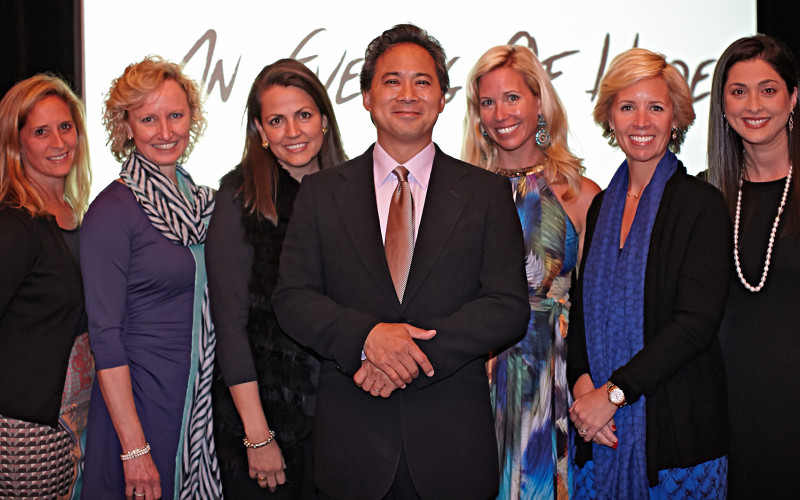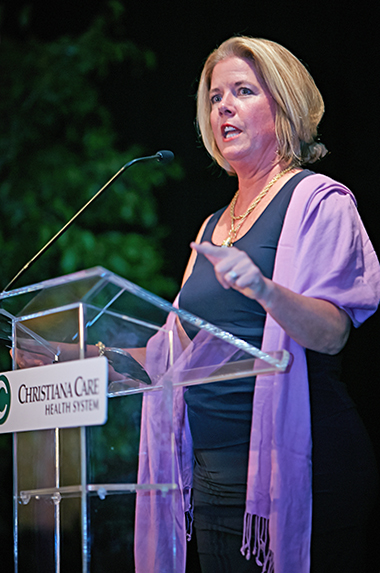An Evening of Hope benefits translational cancer research

The Friends of the Helen F. Graham Cancer Center & Research Institute on Oct. 9 hosted An Evening of Hope, a fundraising dinner to benefit cancer research at the Center for Translational Cancer Research.
The evening delivered a message of hope in the fight against cancer, as William Li, M.D., an international expert on anti-angiogenesis, discussed this emerging modality in treating and preventing a multitude of diseases, including many types of cancer.

Delaware First Lady Carla Markell, herself a breast cancer survivor for nearly a decade, opened the event at Wilmington Country Club.
“The Helen F. Graham Cancer Center & Research Institute is very near and dear to me,” Markell said. “When I got my breast-cancer diagnosis, I got a lot of opinions on who my doctor should be. It was a little overwhelming. I went to get another opinion in Philadelphia, and their response was, ‘Stick with Christiana Care because they’ve got better equipment for radiation and mammography than we do. You’re in good hands.’”
Markell recalled how she was able to receive her treatment at a quiet satellite office on Silverside Road, where the staff was professional, kind and considerate, even allowing her to bring her children along so that she could demystify cancer treatment for them.
“With the Helen F. Graham Cancer Center & Research Institute, on top of the fantastic physicians and nursing staff, the equipment is top-notch,” she said.
In her comments, Markell praised the work of the Friends of the Helen F. Graham Cancer Center and stressed the importance of sharing and openness about cancer, both informally within the community and formally through events such as An Evening of Hope.
In that spirit of sharing, the Friends of the Helen F. Graham Cancer Center invited Dr. Li, president and medical director of the Boston-based nonprofit Angiogenesis Foundation, to speak about research that has shown that a new class of cancer-fighting drugs, as well as everyday foods, have the ability to treat and even prevent certain cancers.
Angiogenesis refers to the body’s natural process for growing blood vessels, which when functioning normally allows for wound healing and reproduction. When the process gets out of balance and the body produces either excessive or insufficient blood-vessel growth, diseases can occur, including cancer, diabetes, arthritis and a host of other debilitating and deadly conditions.
“It’s pretty amazing that there’s a common denominator in the underlying cause of so many diseases,” Li said. “The Angiogenesis Foundation doesn’t just strike out at one disease but looks for common denominators to address multiple diseases. We want to pull back a bow and have one arrow strike 70 disease targets.”
Addressing cancer specifically, he said that all cancers start out as harmless, microscopic cells.
“Most will never ‘grow up’ into cancer because they don’t have a blood supply, and without a blood supply, they can’t expand and enlarge,” Dr. Li said. “The Achilles heel of cancers is that they require a blood supply. If we could boost the body’s ability to prune those blood vessels — if we can block angiogenesis and knock out the blood supply feeding it — we can cripple cancer.”
Li talked about two ways in which angiogenesis research is leading to advances in the fight against cancer: the advent of cancer-fighting anti-angiogenic drugs and the discovery of naturally anti-angiogenic foods.
The first anti-angiogenic drug was approved for cancer treatment in 2004,
and 19 more have been approved since then, with more in the pipeline, Li said. These drugs now are recognized as a fourth modality in treating cancer, he said, along with radiation, chemotherapy and surgery.
However, he acknowledged that the efficacy of anti-angiogenic drugs varies from one type of cancer to another, and in some cases can shrink a tumor rapidly only to have it return soon after.
“Why? For cancers, we’re treating many diseases too late,” he said. “We’re making a dent, but the horse is already out of the barn so we’re not getting the result we really want. But what if we can use anti-angiogenesis to turn the clock back and beat cancer at its own game? If our bodies have the ability to naturally block angiogenesis so we don’t develop clinical cancers in the first place, can we boost our natural defenses rather than give a drug?”
Research has shown that a wide range of common foods can boost, in some cases dramatically, the body’s ability to keep angiogenesis in balance, and block the excessive blood-vessel growth that feeds tumors, Li said. Strawberries, red grapes (including those in red wines), soybeans, broccoli and dark chocolate are just a handful of the foods already found to have strong anti-angiogenic properties. Ongoing research is adding to that list and determining the amounts in which such foods need to be eaten to reap their disease-fighting benefits, Li said. His foundation has started the “Eat to Beat Cancer” campaign to educate the public and continue identifying and researching the potency of various anti-angiogenic foods.
“Both Dr. Li’s work and the work of the Helen F. Graham Cancer Center & Research Institute embody the same spirit of scientific discovery that quickly results in testing new treatments for patients,” said Graham Cancer Center supporter and Christiana Care Trustee Henry Mellon, who arranged for Dr. Li to speak at An Evening of Hope.